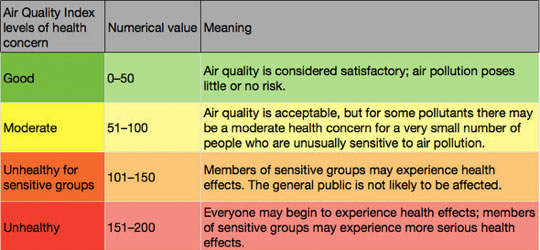
Vol. XI, No. 2, July-September 2012
Air Quality and Outdoor Play
As early childhood administrators, we know that we need to have policies on when to take children outside during both cold and very hot weather. Most centers address these issues in the operating policies. It is my opinion that very little information is provided on how to determine if the air quality is healthy enough to take children outside regardless of the temperature. My hope is that this article will serve as a resource for you as you re-write your outdoor play policy to include the evaluation of the quality of outdoor air.
Children’s lungs continue to develop from birth throughout adolescence and lung function increases throughout childhood. Children also breathe at a faster rate than adults, which means that they are even more susceptible to airborne pollutants. Adverse health affects for children breathing polluted air include aggravating asthma, irritation of the respiratory system, and a reduction in lung function and inflammation in the cells that line the lungs. Repeated short-term damage to children’s developing lung may lead to reduced lung function in adulthood. Take it from someone who uses oxygen nightly, this is not a good thing!
The air we breathe contains pesticides, sulfates, volatile organics, sulfate and a bunch of other junk. This is true of whether you live in the city or in the countryside. How can we best protect our children’s lungs?
The Air Quality Index, AQI, is a rating scale put together by the Environmental Protection Agency (EPA) for daily reporting of air quality. Yes, the government uses the AQI for four major air pollutants regulated by the Clean Air Act. It tells you how clean or unhealthy your air is, and what associated health risks might be. Think of the AQI as a yardstick that runs from 0 to 500. The higher the AQI level, the greater the level of air pollution and the greater the health concern.

AQI values can very from one season to another. In winter, carbon monoxide may be high in some areas because cold weather makes it difficult for car emission controls to operate effectively. Ozone may be higher in warmer months because heat and sunlight increase ozone at the earth’s surface.
Large cities are required to report the AQI to the public daily. Many smaller communities do so as a community service. Some communities do this within the format of the weather coverage and reporting. To make your schedule less complicated, just sign up for EnviroFlash, http://www.enviroflash.info, to get your daily email about the air quality forecast for your geographic area. You can also check out AIRNow, www.airnow.gov, to find more information on air pollution and to learn actions you can take to reduce pollution.
Use these resources to rewrite your outdoor play policy to include guidelines on air quality. Outdoor play policies should include measures for protecting children’s lungs.

